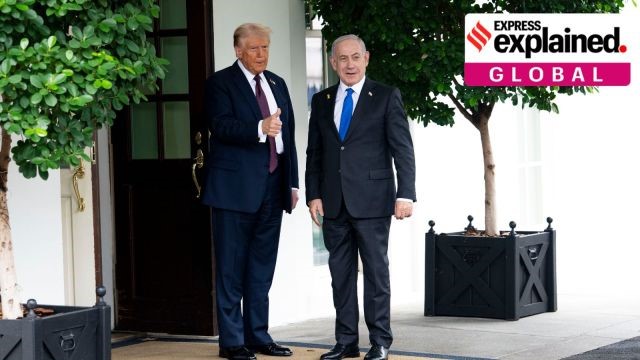International Stabilization Force for Gaza (ISF)

- 10 Oct 2025
In News:
In September 2025, U.S. President Donald Trump unveiled a 20-point “Comprehensive Plan to End the Gaza Conflict”, proposing an International Stabilization Force (ISF) to manage post-war Gaza. While both Israel and Hamas accepted the ceasefire and hostage-release obligations, deep divergences persist over Gaza’s future governance, Hamas’s fate, and the legitimacy of the ISF.
What Is the ISF?
The International Stabilization Force for Gaza is a proposed multinational security mission aimed at maintaining internal stability, enabling phased Israeli withdrawal, and overseeing Gaza’s demilitarization.
- Nature: A temporary but long-term security component of a technocratic, apolitical Palestinian Transitional Committee, which will govern Gaza during the interim period.
- Oversight: The ISF will operate under a “Board of Peace” chaired by the U.S. President, rather than the United Nations (UN).
- Composition: To be formed with “Arab and international partners,” but without a UN Security Council (UNSC) mandate—limiting its neutrality and legal legitimacy.
Objectives and Core Functions
- Demilitarization of Gaza:
- Confiscate and destroy Hamas weaponry.
- Prevent smuggling and block the inflow of arms.
- Security and Law Enforcement:
- Maintain order in “terror-free zones” vacated by the Israeli Defense Forces (IDF).
- Set milestones and timelines linked to Israel’s phased withdrawal.
- Capacity Building:Train and professionalize Palestinian law enforcement under international supervision.
- Governance Transition:Facilitate the formation of a reformed Palestinian security apparatus aligned with the transitional governance framework.
- Monitoring and Compliance:Track progress on demilitarization and withdrawal to prevent relapse into conflict.
Absence of a UN Mandate and Legitimacy Concerns
Unlike traditional UN peacekeeping or stabilization missions, which derive legitimacy from UNSC authorization under Chapter VII of the UN Charter, the ISF is designed to operate outside the UN framework.
- The UN’s role in Trump’s plan is restricted to aid distribution, not peacekeeping.
- Arab states have historically resisted deploying troops in Palestine under non-UN command, citing concerns about political bias and lack of legal accountability.
- Consequently, the ISF’s perceived alignment with American and Israeli objectives could undermine its credibility among Palestinians and regional actors.
Precedents and Lessons from Past Stabilization Missions
Previous stabilization forces outside or alongside the UN framework reveal the complexity and risks of such interventions:
- Afghanistan (ISAF, 2001–2021): Initially authorized by the UN and later led by NATO, the mission expanded into combat operations against the Taliban but failed to establish durable peace.
- Lebanon (MNF, 1982–1983): A U.S.-led multinational force, created outside the UN, withdrew after facing intense violence from militias, highlighting the dangers of intervention without broad legitimacy or consent.
These experiences underscore that stabilization without political resolution often leads to mission failure and regional backlash.
Challenges in the Palestinian Context
- Lack of Political Resolution:
- The two-state solution remains unrealized; Israeli occupation continues in parts of Gaza and the West Bank.
- Without a clear political settlement, any international force risks being drawn into hostilities.
- Israeli and Hamas Positions:
- Israel has refused a full withdrawal from Gaza, citing security concerns.
- Hamas has not agreed to complete disarmament or exclusion from the Palestinian political framework.
- These contradictory stances create operational uncertainty for the ISF.
- Arab States’ Reservations:
- Arab governments have called for aUN-mandated protection force, not a U.S.-led stabilization mission.
- An eight-nation Arab-Islamic statement (Sept 30, 2025) demanded Israel’s complete withdrawal, diverging sharply from Washington’s version of the plan.
- Risk of Renewed Armed Resistance:Partial Israeli withdrawal and continued occupation zones could fuel militant activity, increasing the risk of direct confrontation with the ISF.
- Limited Accountability:Absence of UN oversight and clear reporting mechanisms raises concerns over the ISF’s command structure, rules of engagement, and human rights compliance.
Geopolitical and Strategic Implications
- For the U.S.: The ISF signifies Washington’s intent to maintain strategic control over Gaza’s post-conflict order, reducing UN influence.
- For Israel: The arrangement allows for partial demilitarization without ceding full security control—aligning with its domestic political compulsions.
- For Arab States: It poses a dilemma between supporting stability and avoiding association with a potentially occupation-legitimizing force.
- For Palestine: The lack of a fully sovereign and representative governance framework risks perpetuating disenfranchisement and renewed cycles of violence.
